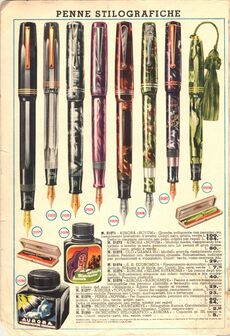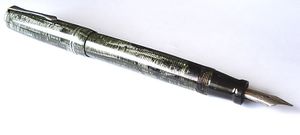Olo
| Olo |
|---|
| Brand pages |
| Brand advertising |
| Brand photos |
The Olo was started as a sub-brand of Aurora in 1929, more or less simultaneously with the sister ASCO and with the release of Duplex celluloid model. The Olo brand appears to have been created to address the the medium and low segment of the fountain pen market, to complement the production of first tier models marked Aurora with lower price (and obviously less valuable) but always of good quality fountain pens. But the trademark was actually recorded (Reg. Gen. N. 41031) in 1929 for something totally different: milk, tea, coffee and surrogates, edible oils and fats, ..., lace, embroidery , felt, paper, paperboard, paper for upholstery, etc..
In commercial diversification strategy implemented by Aurora initially the Olo brand was completely independent, marketed through an extensive network of retail outlets other than ordinary stationers. For this reason, at the beginning of the brand history there was no reference to the parent company nor on the pens nor in related documents; the manufacturer was called Fabbrica di Penne a Serbatoio Olo and as company address was used a post office box in Turin.
This changed only after the mid '30s, when the role of Aurora sub-brand became officially recognized by the appearance of Olo pens in the parent company catalogs, as proposed as lower end pens, but with the usual characteristics of reliability and robustness.
There is no precise dating of the Olo models, although usually you can take as a reference the corresponding models of the Aurora production of which they were a kind of cheap version; they are easily recognizable by clips shapes and materials entirely similar to those of the respective Aurora models.
First Olo models were safeties similar to R.A.3 (with clip) and R.A.0 (with ring), however, marked with the Olo logo (an ellipsoid squared with the OLO inscription inside) both on the nib and on the pen body and on the cap top. These were produced also in laminated gold overlays (marked 18 KR) always in the two previous measures, respectively called Type 3 and Type 0, and with two filling systems: safety and button filler, the latter resumed shapes and clip of the A.R.A. 15, even if the decorations used for the overlay are different from those of the Aurora models.
These first pens were followed by Flat top models, very similar to Parker Duofold, also produced in two sizes and in black and colored celluloid. These pens are characterized by a rather large metal ring on the cap and the OLO logo engraved both on the body near the bottom of the pen and on the nib section. These models were created in parallel to the introduction of the Duplex for which can be considered the economic version.
Following the changes in the Aurora production alsothe Olo models were renewed in the first half of the '30s, with the introduction of the Olo Lusso, produced in two sizes, large and medium, with the same clip of Superna attached to the cap with a metal head with a dowel screw. The pen was made of celluloid machined from solid barrel in the same marbled and crossed lines colors of the Aurora models of the same period and was produced with chrome and golden trim. The OLO logo was reported or on section or on the body.
In the second half of the '30s were then introduced the Olo F and Olo Gamma models, the first was a faceted pen, going back to the similar Novum model. The second was a pen with straightest lines, with a metal cover bottom. Both were offered with combination of mechanical pencils.
In the '40s the production was revised, and a new jagged clip was used, not present on Aurora marked models, but used by the company in other economic production. Moreover, with the introduction in 1938 of Platiridio nibs, also Olo pens were mounted with steel or gold plated steel nibs, marked OLO, which were imprinted in addition to the squared ellipsoid logo also with the production year.
In this 1941 invoice, is mentioned a model called Olo Flexor, produced at least in large and medium sizes. It is not clear to which model it refers. But on a page of a 1940 Aurora catalog published in the Letizia Jacopini book there is a Flexor pen with a "Flexor" imprinted nib, next to a very similar Atena pen. And both have a clip that is substantially identical to the one found on some versions of the Summit S. serie.
The production of fountain pens branded Olo was essentially abandoned after the war.
External references
- none


